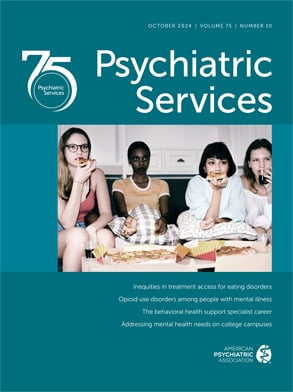To the Editor: Two factors besides ideology contribute to the denial of severe mental illness described so well by H. Richard Lamb (
1) in his commentary in the November 1997 issue: optimism and money. There is a great deal of optimism today about serious mental illness. The recovery model is in ascendance. Even if not promising cure, a recovery approach suggests substantial functional improvement for a majority of individuals with a serious mental illness. Supporting the recovery concept is a belief, as yet largely unsubstantiated, that the new generation of antipsychotic medications will profoundly alter the course of schizophrenia and related disorders.
Although recovery is an important and meaningful concept and the new antipsychotics, especially clozapine, are major steps forward, we must remember that even the most optimistic estimates indicate there is a subgroup of neuroleptic nonresponders—between 30 and 40 percent—who fail to significantly improve with clozapine. In emphasizing the importance of hope and the effectiveness of novel medications, we are in danger of overlooking the existence of patients who continue to do poorly despite state-of-the-art treatment (
2).
Without a doubt, money also is a large contributor to our denial of serious mental illness. There simply is not enough to go around. Our society has never wanted or been able to pay the price to adequately meet the needs of all our citizens with serious mental illness. We are always trying to find the cheapest way to serve the mentally ill among us. We then convince ourselves that the cheapest way is also the best. As Dr. Lamb has been writing for many years, community-based care is effective for the majority of people with serious mental illness. However, good community care is not cheap. Getting adequate resources to establish effective community treatment programs is a struggle.
Our society lacks the will to provide those resources and also maintain the sorts of highly structured, secure programs traditionally offered by state hospitals. It appears then to come down to a choice of having the secure, structured programs for the minority who need them or adequate community programs for the majority who can benefit. Rather than openly acknowledging the conflict, we generally deny the need for more highly structured programs, the denial that Dr. Lamb describes.
The pendulum of mental health ideology and policy keeps swinging, in America and around the world. One can only hope that at some point the pendulum will suspend itself over some middle ground, where the ideology is to provide what each individual needs along the full treatment continuum (
3). Whether we can afford to meet these individual needs will be determined only when we stop all the cost shifting—from state to federal or county government, from the mental health to the criminal justice system, and from private to public payers. In the meantime, I thank Dr. Lamb for reminding us that a just society cannot afford to continue to deny the reality of severe mental illness.

